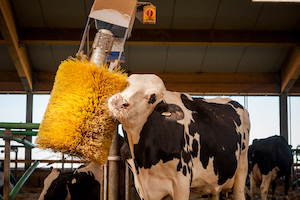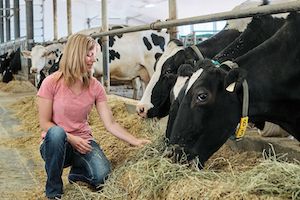How It Works
Providing excellent animal care is one of the most important job requirements when you are a Canadian dairy farmer. Farmers continuously invest in new technology and equipment, work with experts like veterinarians and nutritionists, and apply the latest research to ensure the comfort of their herds. Under proAction, Canadians can be confident that the milk they enjoy was produced in a socially responsible way by farmers who are dedicated to the well-being of their cattle.
Download the Animal Care Fact Sheet
Monitoring and Assessing the Health of our Herds
Under proAction, all farms implement animal care practices based on the requirements in the Code of Practice for the Care and Handling of Dairy Cattle published by the National Farm Animal Care Council (NFACC). The Code is a science-based, nationally developed guideline containing both requirements and best practices for dairy cattle care and handling, with input from the scientific community and a wide range of stakeholders, including farmers, technical experts, veterinarians, animal welfare organizations, food processors, retailers, foodservice providers, and governments.
Cattle assessments are completed every two years through a partnership with Holstein Canada, allowing farmers to monitor their herds’ results over time and compare their progress against established benchmarks and their peers’ progress.
Farmers also work with experts like veterinarians, dairy nutrition advisors, hoof trimmers, dairy specialists, and technicians to continuously improve the comfort and health of their animals.
Implementing best management practices for cattle care
Some of the on-farm practices required under proAction include:
- Comfortable and clean housing
- Top quality feed and water for optimal health and growth
- Medical care when needed and pain control for necessary animal health practices
- Special care for vulnerable animals and careful end of life management
- Quiet, calm animal handling
- Pre-transport decision making
- Staff training to ensure cattle are handled using calm techniques
Investing in research to improve dairy animal health, comfort and care
Dairy Farmers of Canada (DFC) has invested extensively in animal care research since 1996. Animal health and welfare is one of the four major priority areas targeted in DFC’s National Dairy Research Strategy and is allocated approximately 25% of research investments.
Research funded by Dairy Farmers of Canada and its partners (AAFC, NSERC, etc.):
- informed the update of the Code of Practice in 2009;
- is informing the Code of Practice revision process which is currently in progress; and
- led to the development of science-based measures and procedures to assess and improve animal comfort practices.
DFC is currently financing seven research projects to improve animal care and health.
In addition, DFC has supported NSERC Industrial Research on dairy cattle welfare at the University of British Columbia since 1997 and research on the sustainable life of dairy cattle at McGill University since 2015, leading to important advances on better dairy animal comfort and care practices.
Several dairy cattle care experts are also trained annually to serve in the industry.
A Proven Track Record of Continuous Improvement
Continuous improvement has always been, and will continue to be, at the heart of the proAction Animal Care module.
The Code of Practice for the Care and Handling of Dairy Cattle was first published in 2009. In 2012 and 2013, DFC, through a project with NFACC, developed the first version of the Animal Care module of proAction to verify that dairy farmers respect the Code of Practice.
From 2013 to 2015, DFC further developed and piloted the Animal Care module. In 2015, the module was rolled out to farmers through training programs and educational materials. In September 2019, updates were made to improve targeted elements, and the requirements of the module were incorporated into the proAction validation process.
DFC initiated an update to the Code of Practice in 2019 to ensure it reflects the latest science and best practices. The Revised Code of Practice was published in March 2023 and was effective April 2024. DFC is actively working to incorporate the requirements of the Revised Code into the proAction program where appropriate.


